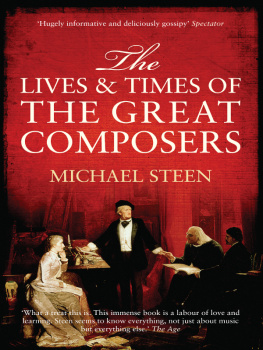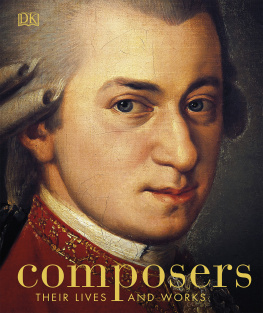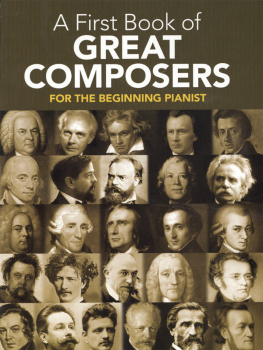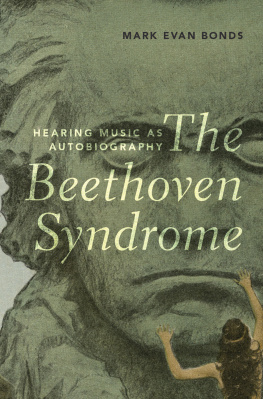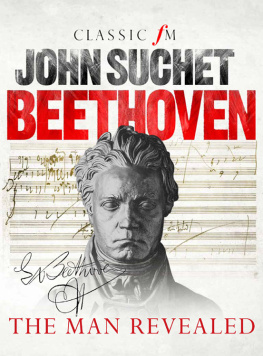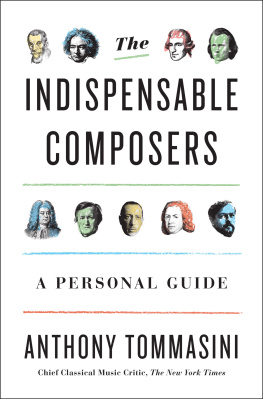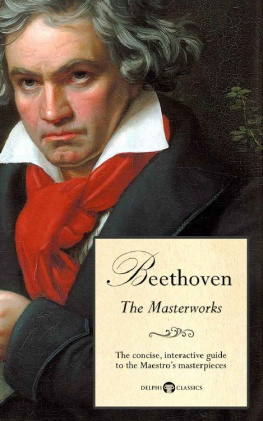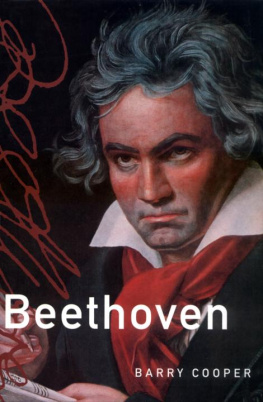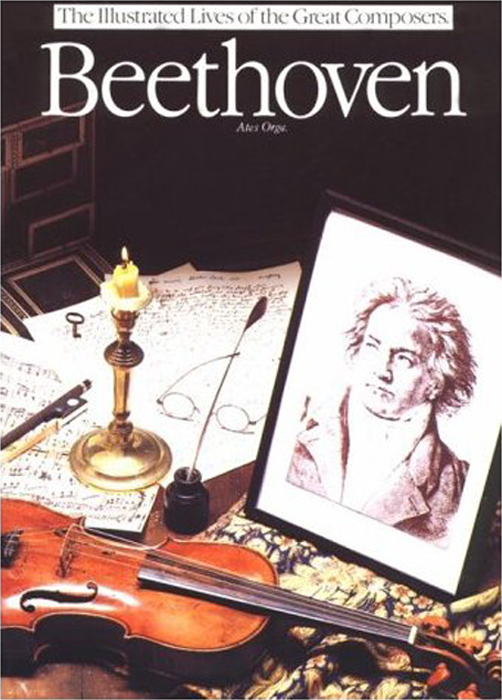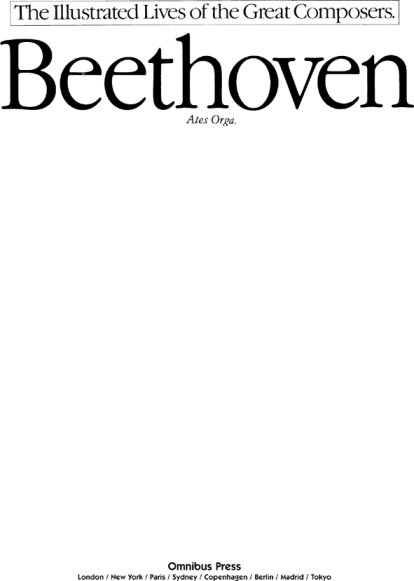In finishing this book I have to first thank my wife Josephine for her immense patience and help, and for all the stimulating hours of discussion that she gave me. For a moment of crucial rescue, Ronald and Rosslyn Farren-Price are owed a debt of gratitude. Thanks must also go to my students for their enthusiastic tolerance and interest, as well as in retrospect to Reginald Smith Brindle, Mosco Carner, Hans Gal, Arthur Hutchings and Basil Lam who all so actively kindled and encouraged my early interest in Beethoven and his work.
My thanks are additionally due to the following for kindly granting permission to quote extracts:
William Kimber & Co., Ltd (George R. Marek, Beethoven)
Macmillan & Co., Ltd./St. Martins Press (Emily Anderson, The Letters of Beethoven). Except where otherwise stated, translations of Beethovens letters are taken from this edition
G. Schirmer Inc./Dover Publications Inc. (O.G. Sonneck, Beethoven: Impressions by his Contemporaries)
Some of the illustrations have come from my own collection or from original prints and engravings. Thanks, however, are due to the following for helpfully granting reproduction rights:
E.M.I.
R.C.A.
Bibliography
Anderson, Emily The Letters of Beethoven, 3 vols. (London, New York 1961)
Arnold, Denis & Fortune, Nigel The Beethoven Companion (London 1971)
Cooper, Martin Beethoven: The Last Decade (London 1970)
Gl, Hans The Golden Age of Vienna (London 1948)
Grove, Sir George Beethoven-Schubert-Mendelssohn (London 1951)
Hamburger, Michael Beethoven: Letters, Journals and Conversations (London 1951)
Kerst, Friedrich & Krehbiel, Edward Beethoven: The man and the artist (1905, New York 1964 reprint)
Kinsky-Halm Das Werk Beethovens (Munich 1955)
Landon, H.C. Robbins Beethoven: a documentary study (Zrich, London 1970)
Beethoven, abridged version of above (Zrich, London 1974)
Marek, George R. Beethoven (New York 1969, London 1970)
McNaught, William Beethoven Groves Dictionary of Music and Musicians, Vol. I (London, New York 1954 ed.)
Orga, Ate Beethoven for Voices, Music & Musicians, XVIII/viii (April 1970)
Genesis of the Ninth, Music & Musicians, XVIII/xi (July 1970)
Schindler, Anton F., edit. D. MacArdle, trans. C. S. Jolly Beethoven as I knew him (London 1966)
Schmidt-Grg, Joseph & Schmidt, Hans Ludwig van Beethoven (Hamburg 1969, London 1970)
Scott, Marion Beethoven (1934, London 1974 rev.)
Sonneck, O.G. Beethoven: Impressions by his Contemporararies (1926 New York 1967 reprint)
Thayer, Alexander Wheelock, rev. and edit. Elliott Forbes Life of Beethoven (Princeton 1967)
Wegeler, Franz & Ries, Ferdinand Biographische Notizen (Coblenz 1838, 1845)
Willets, Pamela J. Beethoven and England (London 1970)
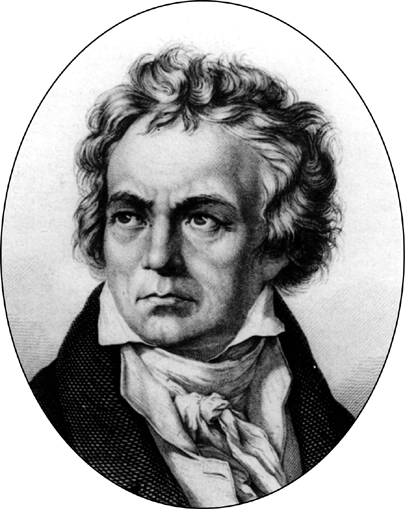
Beethoven. From a late 19th century engraving taken from a Victorian collection of the composers piano music originally published by Augener of Great Marlborough Street, London.
Chapter 1
Omega
When beggars die, there are no comets seen;
The heavens themselves blaze forth the death of princesShakespeare, Julius Caesar.
Monday the 26th of March 1827 was a freezing day. From Silesia and the Sudeten peaks, a north wind blew across the Wienerwald. Everywhere the ground lay under a soft blanket of fresh, silent snow. The long winter had been raw, damp, cold and frosty: on that day it showed no sign of releasing its grip on the land.
By four oclock the lights of Vienna, the street lamps, the candles of a myriad rooms, began to pierce the overcast gloom. The day had all but run its course. On the second floor of the Schwarz-spanierhaus, the House of the Black Spaniard to the west of the old city walls, lay a man who had also all but run his course. In a large, sparsely furnished room of sad appearance, amid squalor and books and manuscript paper, and within sight of his prized mahogany Broadwood grand, Beethoven, the General of Musicians, lost hold of life. On a roughly made bed, unconscious, he was at that moment as broken and finished as his piano. The elements continued to rage. Flurries of snow drifted against the window. Then there was suddenly a loud clap of thunder accompanied by a bolt of lightning Beethoven opened his eyes, raised his right hand, and, his fist clenched, looked upwards for several seconds As he let his hand sink down onto the bed again, his eyes half closed There was no more breathing, no more heartbeat! The great composers spirit had fled from this world of deception into the kingdon of truth. So remembered Anselm Httenbrenner. Another contemporary, Joseph Carl Rosenbaum, recorded Beethovens end even more poignantly in the terseness of a Diary entry: Ludwig van Beethovens death, in the evening, towards six oclock, of dropsy in his fifty-sixth year. He is no longer! His name lives in fames illumination.
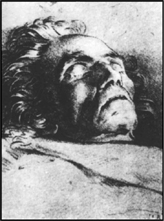
Beethoven on his deathbed. Lithograph by J. Danhauser


